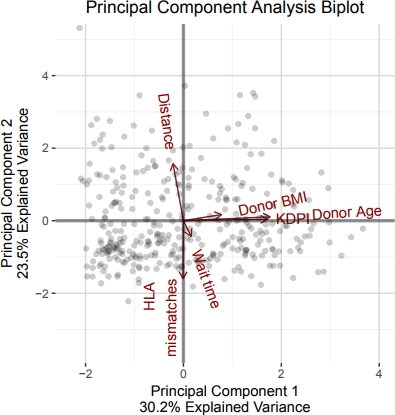What Deceased Donors Do KPD Candidates Accept?
1UNOS, Richmond, VA
2Carolinas HealthCare Sys, Charlotte, NC
3Univ Hosp Med Ctr, Cleveland, OH
4Carnegie Mellon Univ, Pittsburgh, PA
5Emory Univ, Atlanta, GA.
Meeting: 2018 American Transplant Congress
Abstract number: 451
Keywords: Donation, Kidney, Kidney transplantation
Session Information
Session Name: Concurrent Session: Kidney Paired Exchange
Session Type: Concurrent Session
Date: Tuesday, June 5, 2018
Session Time: 2:30pm-4:00pm
 Presentation Time: 3:42pm-3:54pm
Presentation Time: 3:42pm-3:54pm
Location: Room 4B
Background: Possible utilization of deceased donors (DDs) to initiate KPD chains has been of interest to the transplant community. OPTN KPD candidates are required to also be listed on the waitlist and many leave the program for a DD transplant. Understanding the types of DD those candidates are willing to accept can shape policy development.
Methods: 352 OPTN KPD candidates who received a DD kidney-alone transplant from 10/27/2010 to 8/31/2017 were included in the cohort. Donor age, BMI, KDPI, distance between donor and transplant hospital, candidate waiting time, and number of HLA mismatches were included in a principal component analysis (PCA).
Results: While the median donor KDPI was low (35%), KPD candidates accepted a wide range of DDs (IQR 16% – 57%). The first two components of the PCA were plotted and capture 53% of the variation in characteristics included in the model. The first component was largely made up of donor characteristics: BMI, Age, KDPI. We see that these variables are correlated, as expected because donor age, height, and weight are components of the KDPI calculation. We do not observe that candidates are looking for a trade-off between these factors, such as accepting an older donor with a relatively low KDPI. The second component shows a divergence in candidate-donor characteristics. DDs that were recovered far from the transplant center may be accepted if the HLA mismatch is low. Candidate's waiting time has a small effect on what type of donor they will accept. Most of the accepted donors are in the lower left quadrant, which suggests KPD candidates are looking for DDs with low KPDI, age, and BMI. High HLA mismatch is acceptable when the other donor criteria are met.
The first component was largely made up of donor characteristics: BMI, Age, KDPI. We see that these variables are correlated, as expected because donor age, height, and weight are components of the KDPI calculation. We do not observe that candidates are looking for a trade-off between these factors, such as accepting an older donor with a relatively low KDPI. The second component shows a divergence in candidate-donor characteristics. DDs that were recovered far from the transplant center may be accepted if the HLA mismatch is low. Candidate's waiting time has a small effect on what type of donor they will accept. Most of the accepted donors are in the lower left quadrant, which suggests KPD candidates are looking for DDs with low KPDI, age, and BMI. High HLA mismatch is acceptable when the other donor criteria are met.
Conclusions: While many candidates sought low KDPI kidneys, limiting the allocation for DD chains to KDPI <= 35% may not be necessary. Half of the KPD candidates were transplanted with >35% KDPI kidneys. Other analyses that include categorical variables may help explain the remaining 47% of variation in DD acceptance by KPD candidates.
CITATION INFORMATION: Toll A., Leishman R., Casingal V., Aeder M., Sandholm T., Turgeon N. What Deceased Donors Do KPD Candidates Accept? Am J Transplant. 2017;17 (suppl 3).
To cite this abstract in AMA style:
Toll A, Leishman R, Casingal V, Aeder M, Sandholm T, Turgeon N. What Deceased Donors Do KPD Candidates Accept? [abstract]. https://atcmeetingabstracts.com/abstract/what-deceased-donors-do-kpd-candidates-accept/. Accessed February 19, 2026.« Back to 2018 American Transplant Congress
